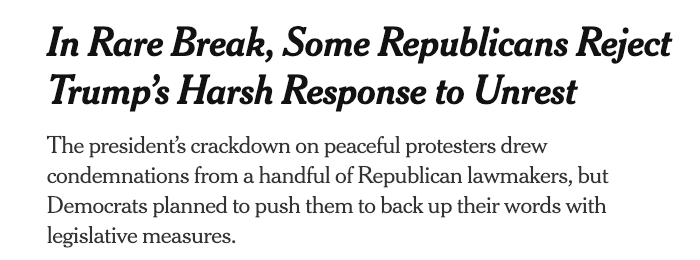Seth takes a closer look at President Trump trying to convince Americans he suddenly cares about the pandemic he’s been ignoring for months.
News media are falling yet again into a predictable trap, commending President Donald Trump for a supposed “new tone” at his July 21 press briefing on the coronavirus pandemic, and saying he seems to be taking the crisis more seriously.
This is the same press briefing at which Trump said of the case of accused sex trafficker Ghislaine Maxwell, “I wish her well.”
Media Matters has previously cautioned the media against accepting a supposed “new tone” from Trump on the coronavirus — all the way back in early April, when an initial wave of such praise occurred after Trump warned of a “very, very painful” period ahead at his March 31 briefing. (At the time, this blunt admission came after Trump had previously insisted for months that the outbreak was “totally under control.”)
Even before the latest press conference on July 21 was actually held, ABC News tweeted this message Tuesday afternoon:
Here's how some other media outlets reacted to Trump's appearance:
Comedy Central’s The Daily Show posted this clips reel showing TV news shows lauding Trump’s supposed “new tone,” from such diverse sources as CBS News, NBC News, Fox News, MSNBC, CNN, and the local ABC News broadcast in New York City.
In June 2016, Senate Majority Leader Mitch McConnell (R-KY) appeared on CNBC’s Squawk Box to discuss Republicans’ imminent nomination of then-candidate Donald Trump. There, he sought to calm the nerves of Trump-skeptical members of his party.
“I do think that the Constitution and the traditions of this county constrain all of us -- those of us in Congress and those of us in the White House -- from some of our impulses, shall I say, that we’d like to pursue,” said McConnell about concerns that a Trump presidency would resemble the chaos of his candidacy.
Three and a half years into Trump’s presidency, and it’s clear that congressional Republicans haven’t been the moderating force McConnell promised that day on CNBC. Far from McConnell’s assurance that Trump’s “not going to change the platform of the Republican Party, the views of the Republican Party,” the party has fallen in line behind Trump’s leadership. McConnell, for his part, has voted with Trump's agenda 94.2% of the time. Even Sen. Shelley Moore Capito (R-WV), who distanced herself from Trump following the 2016 release of Trump’s infamous Access Hollywood tape, has come around on the Republican standard-bearer, voting with him 95% of the time.
And that’s precisely why it’s so confusing to see article after article in mainstream media outlets reporting on the comments whenever Republican lawmakers do criticize him, however toothlessly. Those critiques often come when it’s politically expedient for the politicians to make them. For instance, as Trump’s poll numbers decline amid the chaos brought on by the COVID-19 pandemic and civil unrest, congressional Republicans appear more willing to break ranks with him.
These lawmakers want to have it both ways. While continuing to buoy the president’s agenda with their votes and legislation, they have taken to publicly opposing aspects they find politically risky without actually using their power as elected officials to rein in anything they truly see as being out of bounds. News outlets, then, need to take more care in their coverage of these claims, examining the depth of the critiques.
Outlets like The Washington Post and The New York Times hype the “chorus of Republicans” who push back ever so gently on Trump’s rhetoric and agenda.
In January 2019, The New York Times published a piece about McConnell’s “rebuke” of Trump’s foreign policy goals, noting that “the disconnect between President Trump and the Republican establishment on foreign policy has rarely been as stark.” Though several Republicans criticized Trump’s plans to pull troops from Syria and Afghanistan, they did next to nothing to actually prevent him from actually doing it. In October, the House of Representatives passed a nonbinding resolution condemning his Syria policy, but that was the extent of their actions
McConnell, the Times wrote, “broke with Mr. Trump on nearly every major issue related to the virus” in recent comments.
While it’s true that there is some dissent coming from congressional Republicans regarding the pandemic, news outlets have a responsibility to highlight how transparently self-serving it is.
For instance, after Trump had protesters violently dispersed outside the White House in early June, the Times ran a piece about some Republicans’ supposed rejection of Trump’s “harsh response to unrest.
Whatever their objections may be, they haven’t taken any action to prevent him from continuing the use of unidentified federal law enforcement officials to engage with protesters. Rep. Alexandria Ocasio-Cortez (D-NY) and Del. Eleanor Holmes Norton (D-DC) plan to introduce legislation that would require federal agents to display identification on their uniforms. While this wouldn’t prevent Trump from using agents to police protests, it would impose a level of accountability that goes beyond shaking heads, furrowing brows, and making annoyed and forced public comments.
It’s become clear that congressional Republicans are increasingly concerned about Trump’s reelection odds and want to get themselves on the record as being opposed to his extreme actions -- or, as was the case with many aspects of the pandemic, inaction -- so that further down the line they won’t be held accountable for things he did as president. This is about salvaging their own reputation and hedging their bets on Trump’s legacy, and it’s important that news outlets make this clear in their own reporting. This is Trump’s party now, and journalists have a responsibility to hammer that point home in the face of the GOP public relations onslaught.





No comments:
Post a Comment